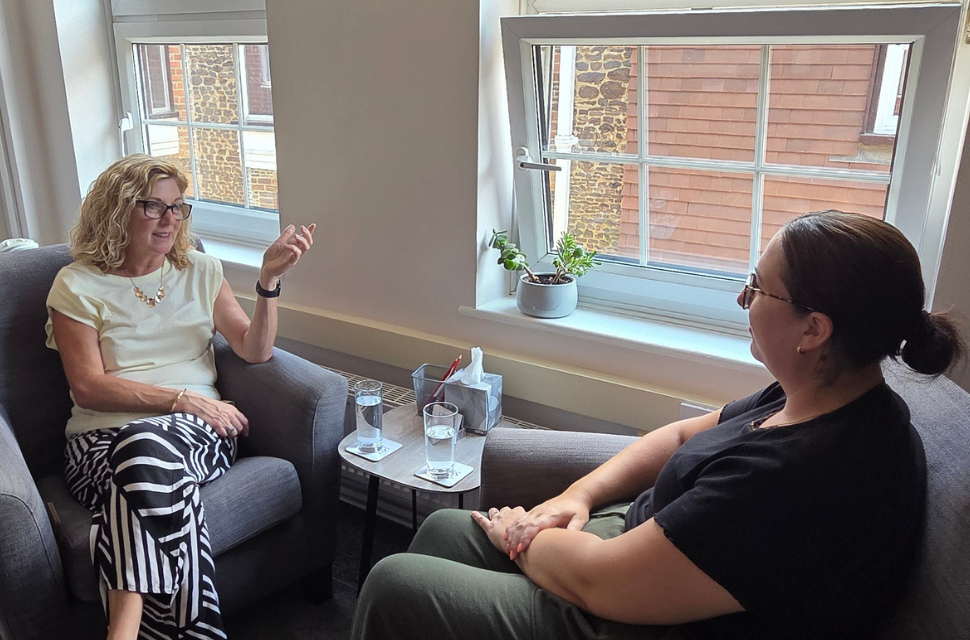We will all experience grief and loss at some point in our lives – but when it arrives, it can feel anything but “normal”. Whether it’s the death of a loved one, the end of a relationship, or another significant transitional moment in life, all can bring a powerful sense of loss. Whatever its origin, grief often brings with it waves of emotions that can be overwhelming, confusing and unpredictable. At times, you might feel sadness, anger, numbness, guilt, and even relief – sometimes all in the same day. These emotional shifts aren’t signs that something is wrong with you, they’re signs that you’re human, navigating a deeply personal loss in your own unique way.
There is no roadmap for grieving, even if at times we may wish there were – wouldn’t that make all this easier somehow? You might have heard of the five stages of grief – denial, anger, bargaining, depression and acceptance. While these can be useful in understanding grief, the sense that they are moved through in order from one stage to the next often is not the case. You might revisit feelings again and again or even skip some entirely. Some people cry, some people don’t cry at all. Some need to talk through every detail, trying to make sense of the loss; others find it too challenging or painful to verbalise their process.
All of this is to say that the “right” way to grieve is the way that you grieve; you are the expert of your process. The sense that you might be doing it “wrong” can only add to the weight you already carry.

It can be easy to think that grief might only be associated with death, but loss can come in many forms. You might also be grieving:
• The end of a relationship, marriage or friendship
• Fertility struggles
• A change in health or mobility
• A job loss
• Career change
• Loss of identity
• The life you imagined for yourself, or the one you thought you had
These losses may not always be recognised by those around you, but that doesn’t negate your personal lived experience or make your grief any less real or important.
I know grief not just professionally through my client work, but also from my own lived experience. I lost a sibling — a loss that reframed the way I see the world and myself. For me, this kind of grief doesn’t go away; rather I grew around it. It became a part of my personal landscape in a way that I have come to value, although it isn’t always easy or straightforward. I’ve also worked alongside clients facing unexpected changes to their health, which brought its own kind of grief — the grief of adjusting to a different version of themselves than they’d imagined. These experiences have taught me that grief isn’t always a huge bomb that explodes in your life. Sometimes it’s a quiet, lingering sense in the background of your day. I share this with the aim, not of claiming to be an expert, but to show how unique and deeply personal any sense of grief and loss can be. And that whatever form it takes, all are valid, real and important.

There are no quick fixes for grief, but there are things that support you in moving through your experience of it in a way that offers yourself grace, care and understanding:
• Give yourself permission to feel – whatever shows up, however that looks for you
• Try not to rush yourself through the process – it can be tempting to try and get through this painful part as quickly as possible, there is no set timeline for healing
• Connect with people you trust – sharing your experience can ease the weight you are carrying
• Make space for rest – grief can be physically and emotionally exhausting.
• Find outlets that feel right for you – writing, movement, art, music, stillness
• Try not to judge yourself – this is your unique experience, only you know what that feels like at any given moment
• Reach out for help and support – when you feel ready

If you are facing the challenges of grief and loss you don’t have to face the journey alone. Counselling offers a space where together we can begin to make sense of things, at your pace. Reach out when you are ready, you will be welcomed exactly as you are with empathy, respect and an open mind.
Bereavement can be one of the most profound and challenging experiences we face. The loss of someone close to us can bring waves of emotion that are sometimes difficult to understand or manage. Feelings of sadness, anger, guilt, or even relief are all natural parts of the grieving process, and everyone experiences them differently. There’s no timeline for grief, and no single “right” way to cope.
If you’re struggling to come to terms with a loss, bereavement counselling can offer a safe and supportive space to explore your feelings and begin to heal. You can find support and more information about bereavement counselling at The Eaves: Bereavement Support.